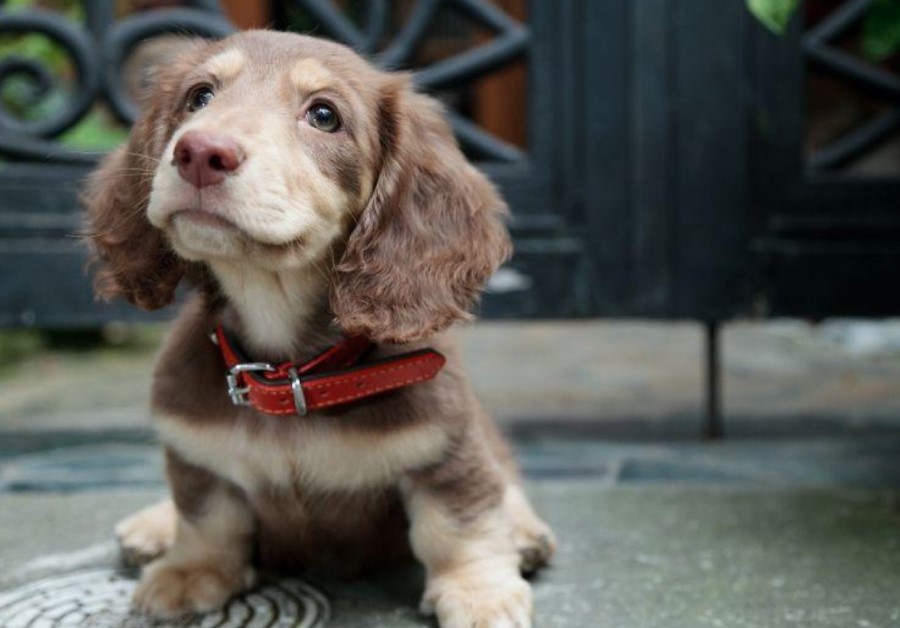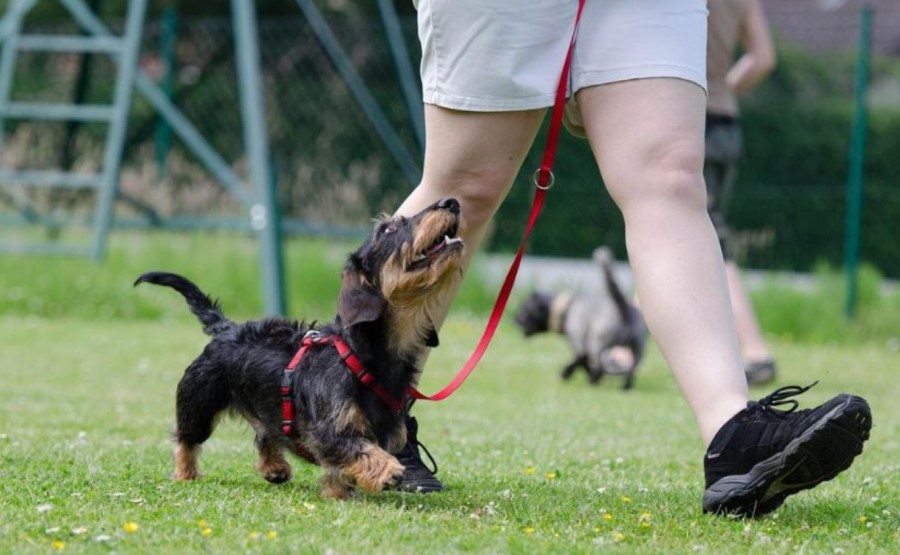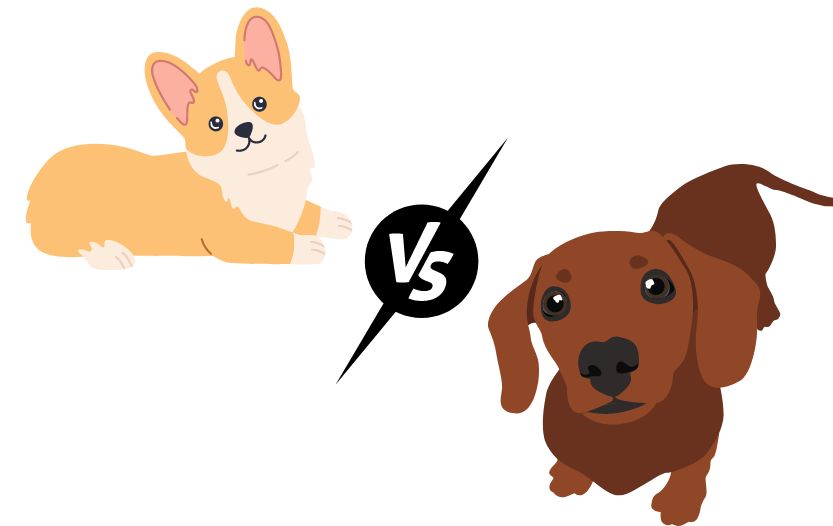Welsh Corgis and Dachshunds were created for very different reasons.
The smallest breed, Welsh Corgis, was used mostly for herding cattle, but Dachshunds are a hunting breed with a brave and self-assured temperament. The wiener dog comes in two sizes, just like the Corgi.
There are two breeds of dachshunds: standard and miniature. At the same time, the Cardigan Welsh Corgi is larger the larger version, and the Pembroke Welsh Corgi is smaller.
Potential owners should be informed that Corgis and Dachshunds are adaptable breeds with differences and similarities in their temperaments, grooming needs, trainability, and more.
So let’s dive into more detail now!
Dachshund vs Corgi Temperament
Dachshunds and Corgis have fairly different temperaments. Dachshunds are loyal, independent, and alert, with a bold and active personality. They are also very affectionate towards their families and are often called “velcro dogs” for their tendency to follow their owners around.
Corgis, on the other hand, are friendly, cheerful, and live to please their owners. They are active, intelligent, and have a natural herding instinct. They can be a bit mischievous and have a tendency to bark more than other breeds. They also tend to be more cuddly and affectionate than Dachshunds.
Dachshund vs Corgi Barking
A Corgi will have a higher-pitched bark than a Dachshund. Corgis will often bark in short bursts and can be quite vocal, while Dachshunds tend to bark more deeply and for longer periods of time.
Corgis and Dachshunds both frequently bark. Corgis and Dachshunds are effective watchdogs because they know when to bark at their owners to let them know when a stranger approaches their home.
Dachshund vs Corgi Bodies

When it comes to their body shapes and sizes, there are several differences between the two.
Dachshunds have long, slender bodies, with short legs and long spines that give them an almost sausage-like appearance. Their heads are usually long and pointy, and their ears are usually floppy.
Corgis, on the other hand, have a much more distinctive body shape. They have a much shorter, stockier build, and their legs are much shorter than those of dachshunds. They have a more rounded head, and their ears are usually pointy and erect.
While both breeds have a similar weight range, dachshunds are typically much longer than corgis, measuring up to 16 inches long, while corgis typically measure up to 12 inches long.
Corgi vs Dachshund Grooming
Dachshunds have long, wiry coats that must be brushed regularly to prevent matting. Additionally, they must be trimmed every few weeks to keep the coat in good condition and prevent the fur from getting too long.
Corgis have a thick, double coat of fur that needs to be brushed at least twice a week to keep it from becoming matted. Both breeds benefit from regular baths and occasional trims to keep their fur looking neat and healthy. The face and tail should be cleaned regularly to prevent dirt and debris from accumulating.
Both breeds need their nails trimmed and their ears checked regularly, and they should have their teeth brushed daily. All of these things should be done to keep the coat and skin healthy and the breed looking its best.
Other regular grooming requirements for Dachshunds and Corgis include tooth brushing with dog toothpaste. Dogs should get their nails cut roughly every six weeks.
Dachshund vs Welsh Corgi Lifespan
When it comes to lifespan, the dachshund and the corgi are pretty different. The average lifespan for a dachshund is 12-16 years, with some living up to 20 years. Dachshunds are a long-lived breed for their size and are known for their loyalty and devotion.
Corgis, on the other hand, have an average lifespan of 10-12 years, with some living up to 15 years. While they may not live as long as dachshunds, they make up for it in personality and energy. Corgis are known for their intelligence and playful nature, making them excellent family companions.
So while both breeds have similar lifespans, their personalities and energy levels are pretty different. If you’re looking for an active and affectionate dog, the corgi may be the better choice. However, the dachshund may be a better fit if you’re looking for a loyal and devoted pet. Ultimately, the decision should be based on your lifestyle and preferences.
Dachshunds vs Corgi Size
Welsh Corgi and Dachshund dog sizes comparison is given below:
Dachshunds are of two sizes: Standard and Miniature.
Miniature Dachshund
Miniature Dachshund’s weight range is 9 and 11 lbs. (4 to 5 kg)
Miniature Dachshund’s height range is 5 to 6 inches (13 to 15 cm)
Standard Dachshund
Standard Dachshund’s weight range is 16 to 32 lbs. (7.2 to 14.5 kg)
Standard Dachshund’s height average is 8 to 10 in (20 to 25 cm)
Pembroke Welsh Corgi and Cardigan Welsh Corgi are two kinds of Welsh Corgi. Pembroke Welsh Corgis are smaller than Cardigan Welsh Corgis in size.
Cardigan Welsh Corgi

Female Cardigan Welsh Corgi weighs 24 to 33 pounds (10 to 15 kg)
Male Cardigan Welsh Corgi weight: 31–37 lbs. (14 to 17 kg)
Cardigan Welsh Corgi Height is 10 to 13 inches (25 to 33 cm)
Pembroke Welsh Corgi
Pembroke Welsh Corgi Female Weight range is 22 to 29 pounds for women (10 to 13 kg)
Pembroke Welsh Corgi male weighs 22 to 33 lbs. (10 to 15 kg)
Pembroke Welsh Corgi male weighs 22 to 33 lbs. (10 to 15 kg)
Pembroke Welsh Corgis height range is 8.9 to 12 inches (23 to 30 cm)
Welsh Corgi dogs are smaller than Standard Dachshunds (the largest Dachshund breed) in both height and weight. Dachshunds are smaller and less substantial than Welsh Corgies.
Dachshund vs Corgi Shedding
When it comes to shedding, both dachshunds and corgis have similar levels. Both breeds have a double coat of fur, which is designed to keep them warm and protected from the elements. Both breeds shed their entire coat twice a year, usually during the spring and fall.
Even during the non-shedding season, regular brushing is necessary to keep their coat free of any dead hair.
The difference between dachshunds and corgis is the type of fur. Dachshunds have a short, smooth coat that sheds moderately throughout the year.
On the other hand, corgis have a thick, dense double coat that requires more frequent brushing and grooming. The shedding of the corgi’s coat is more intense than the dachshund’s and thus requires more frequent brushing.
In general, both dachshunds and corgis shed an average amount of fur. However, the type of fur and the frequency of brushing required for each breed is different. Dachshunds need a moderate amount of brushing, whereas corgis need more frequent brushing and grooming to keep their coat free of dead hair.
Corgis vs Dachshunds Prices
The prices of Dachshunds and Corgis vary greatly depending on their pedigree and the breeder. Generally, Dachshunds cost an average of $500 to $1,500, while Corgis cost anywhere from $500 to $2,500.
When it comes to price, Dachshunds are cheaper than Corgis, but the latter tend to have higher maintenance costs. Corgis require more grooming, and their coats need regular brushing. They also need to be taken for regular vet visits. Dachshunds, on the other hand, need less maintenance, but they do need a few grooming sessions.
In the end, it is up to the buyer to decide which breed best fits their lifestyle and budget.
Corgi vs Dachshund: Country of Breed Origin
The Dachshund and the Corgi are two popular, distinct breeds of dogs, with each originating from different country.
The Dachshund, sometimes referred to as a ‘sausage dog’ or ‘wiener dog,’ is believed to have originated in Germany in the early 1600s. It is believed that this breed was bred and developed to hunt small animals such as badgers, foxes, and rabbits. The Dachshund is affectionately known for its long, low body and stubby legs.
The Corgi, on the other hand, is believed to have originated in Wales, where it was bred as a cattle herding dog. Corgis are known for their short legs and long backs and have remained a popular breed throughout the years.
Corgis vs Dachshund as Family Dogs
Welsh Corgis and Dachshunds are energetic, active dogs that make wonderful family pets for households with older, responsible children.
In terms of differences, Dachshunds require less exercise than Corgis, making them better suited for a family that doesn’t have much time for walks and playtime. Corgis, however, are more active and require more exercise and stimulation. Dachshunds also tend to be more vocal than Corgis and can be more prone to barking and howling.
Due to their fragility and potential for injury when playing with young children, miniature Dachshunds may not be the best choice for families with very young children.
Children should be taught not to pick up dogs because Corgis and Dachshunds have delicate backs that could be gravely hurt in an accident. Remember that the primary caregivers for Corgi or Dachshund dogs should only be adults. Children could neglect to feed, walk, and provide clean water for the dog every day.
Additionally, only an adult could assist if the pet wasn’t feeling well because children lack the knowledge and expertise required to know what to do. Children need to be taught by adults how to handle and care for a Corgi or a Dachshund.
For instance, children should not play with the dog when eating or sleeping. Getting a pet for the family is a lovely experience, but it also carries a lot of responsibility.
Corgi vs Dachshund as Companion Dogs

The dachshund is a smaller breed, making it a great choice for those who don’t have much space in their home. Dachshunds tend to be more independent and less needy than other breeds. They also tend to be quite vocal, so those who don’t like a lot of barking should look elsewhere.
The corgi is a larger breed and often more energetic than the dachshund. They are also more social and need more attention and affection than the dachshund. They are very intelligent and can be trained easily, making them great companions for active families.
The dachshund and corgi are both great breeds for those looking for a canine companion. Which breed you choose will depend on your lifestyle, living space, and personal preference. Both breeds make great family dogs, and both will bring lots of love and joy to your home.
Welsh Corgi vs Dachshund Compatibility With Other Dogs
Corgis and Dachshunds must be socialized from a young age to grow up feeling at ease with other dogs. Welsh Corgi males occasionally act aggressively toward other odd male dogs, although both Dachshunds and Welsh Corgis get along with other dogs.
When given a chance to grow up with other dogs, Corgis and Dachshunds usually get along well with the other dogs in the family.
Corgi vs Standard Dachshund Intelligence
The intelligence of Dachshunds and Corgis varies from dog to dog, but overall, Corgis tend to be viewed as slightly more intelligent than Dachshunds. Corgis are often lauded for their obedience and trainability, with the AKC stating that they are “eager to learn and willing to please.” On the other hand, Dachshunds are known to be stubborn and independent, which requires more patience and consistency when training.
Corgis excel at tasks that require problem-solving skills or mental stimulation, and they are often used as working dogs due to their quick thinking and adaptability. On the other hand, Dachshunds can be trained to perform certain tasks, but they respond best to a reward-based training system.
Corgis tend to be more obedient than Dachshunds, and they are more likely to follow commands without hesitation. Dachshunds, however, can be difficult to train due to their independent nature, so owners must be willing to put in the extra effort.
Overall, Corgis are often considered to be more intelligent than Dachshunds. They tend to learn commands faster and have an easier time adjusting to their environment. Dachshunds, however, are loyal and loving companions who can be trained with patience and consistency.
Corgi vs Dachshund Trainability
Dachshunds generally have a strong will and can be quite stubborn when it comes to training. It’s important to be consistent and patient when working with a dachshund, as they require a gentle yet firm hand. Positive reinforcement works best with this breed, as they do not respond well to negative reinforcement.
In contrast, corgis are highly trainable and eager to please their owners. They are quick to learn and respond best to positive reinforcement. Corgis are devoted and loyal to their owners, and thrive in an environment where they receive consistent and clear commands.
Overall, both breeds are capable of being trained, but the dachshund may take a bit more patience and consistency to ensure successful training. Corgis, on the other hand, are more likely to respond quickly and positively to training efforts. Ultimately, the best way to determine which breed is better for you is to consider your lifestyle, experience with training, and the amount of time you are willing to dedicate to training your pup.
Corgi vs Dachshund Exercise Requirements
Dachshunds are typically considered low-energy dogs and require less physical activity than Corgis. A daily walk is generally enough to keep them healthy and happy. They can also benefit from occasional playtime or light jogs.
Corgis, on the other hand, have a higher energy level and require more exercise than their Dachshund counterparts. They need at least an hour of vigorous exercise every day, such as running, playing fetch, or going for a long walk or jog. Regular exercise can help prevent health issues, such as obesity and joint problems, which are common in this breed.
In addition to physical activity, both breeds benefit from mental stimulation. Interactive toys, puzzle games, and obedience classes are all great ways to keep their minds active.
Overall, Dachshunds and Corgis have different exercise requirements, but both breeds require daily physical activity and mental stimulation to stay healthy and happy.
Corgi vs Dachshund Health Concerns
Dachshunds are prone to intervertebral disk disease, an ailment that affects their spines. This can lead to paralysis, urinary and fecal incontinence, and even death. Dachshunds may also suffer from patellar luxation, a condition in which the kneecaps can become dislocated. This can cause lameness and pain.
Corgis, on the other hand, tend to suffer from hip and elbow dysplasia, both of which can cause arthritis and other joint problems. Corgis may also be prone to progressive retinal atrophy, a condition that causes progressive vision loss. Additionally, some Corgis can suffer from von Willebrand Disease, a disorder of the blood clotting system that can lead to heavy bleeding during surgery or injury.
Both breeds are also prone to obesity, which increases their risk of developing other health issues. It’s important to keep these dogs in shape with regular exercise and a balanced diet.
Corgi vs Dachshund Popularity
- According to the AKC, Dachshunds are the 194th most common breed in the United States.
- The Pembroke Welsh Corgi ranks 18 out of 193 breeds in terms of popularity.
- Cardigan Welsh Corgis are rated 69 out of 193 in popularity in the United States, substantially less popular than Pembroke Corgis.
In contrast to Corgis, dachshunds are more common in the US.
Corgi vs Dachshund Owner Loyalty
The Dachshund is an independent breed that is known for being independent and stubborn. They are protective of their owners and bond closely with them, but they can also demand a lot of attention.
Corgis, on the other hand, are extremely loyal and devoted to their owners. They are incredibly social and thrive on being close to their owners, seeking out affection and interaction. Corgis are eager to please, making them easier to train than Dachshunds.
When it comes to loyalty, both breeds are equally devoted to their owners. Dachshunds and Corgis will often follow their owners around, wanting to be involved in whatever they are doing. Both breeds are also fiercely protective of their owners and will bark or growl if they sense a threat.
Dachshunds and Corgis both require plenty of love and attention from their owners in order to thrive. They both crave companionship and can form strong bonds with their owners. However, Dachshunds may be more independent and less eager to please than Corgis.
FAQs
Is a Dorgi Part Dachshund?
The Dachshund and Corgi dog breeds were crossed to create the mixed breed dog known as the Dorgi. These puppies have acquired some of their parents’ best traits, including loyalty, friendliness, and intelligence. On occasion, Dorgis are also referred to as the Dorgi.
What is a Cross Between a Corgi and a Dachshund Called?
A dog that is a cross between a Welsh Corgi and a Dachshund is a Dorgi. No recognized kennel club recognizes this breed as a breed.
A corgi owned by Queen Elizabeth crossed with Princess Margaret’s Dachshund, Pipkin, to create this hybrid.
What Two Breeds Make a Corgi?
One of two breeds is referred to as a Welsh Corgi. Pembroke Welsh Corgis are canine descendants of the Spitz breed.
The second is the Cardigan Welsh Corgi, a member of the Teckel dog family that also gave rise to the Dachshund.
Is Corgi a Good First Dog?
Due to their friendly temperament, intelligence, and tiny stature, corgis can make excellent first-time dogs. They are content in most settings and get along with kids.
What is a Cowboy Corgi?
The Cardigan Welsh Corgi and Pembroke Welsh Corgi were crossed to create the American Corgi, while the Pembroke Welsh Corgi and an Australian Cattle Dog were crossed to create the Cowboy Corgi.
Final Words
The two breeds of dogs are great! It really just comes down to the person you are.
There are a ton of resemblances between these two breeds, from the barking to whether they’re good family dogs.
So, do you like one or the other? Let us know in the comments.

